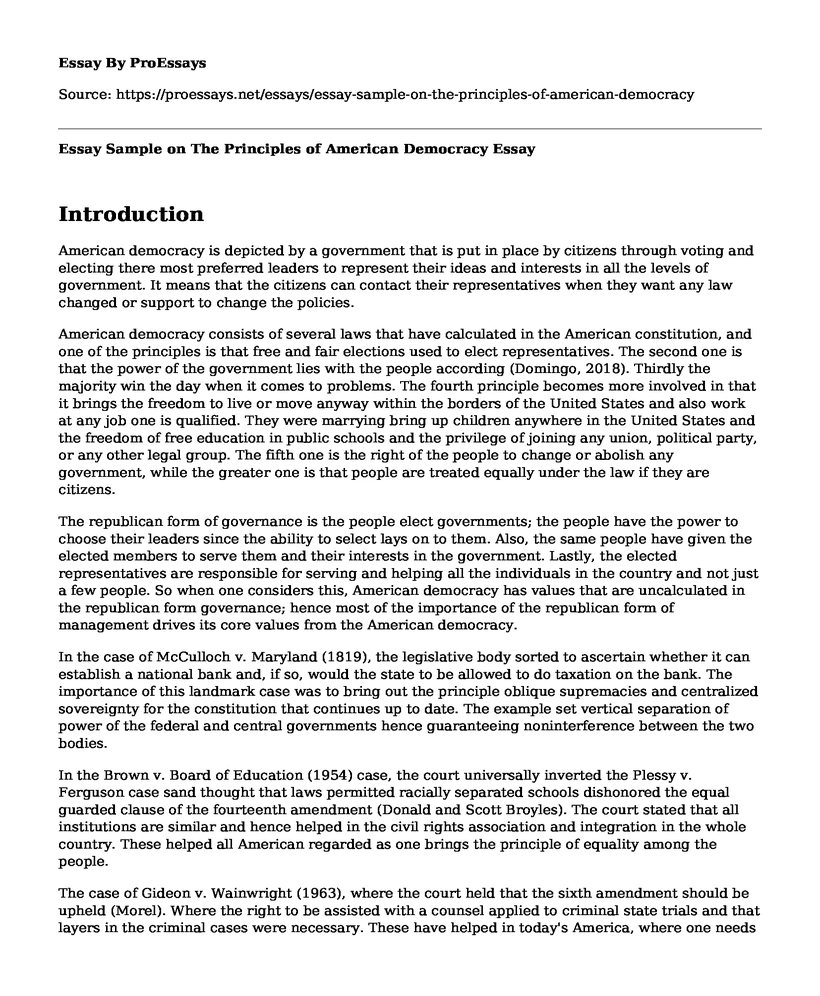Introduction
American democracy is depicted by a government that is put in place by citizens through voting and electing there most preferred leaders to represent their ideas and interests in all the levels of government. It means that the citizens can contact their representatives when they want any law changed or support to change the policies.
American democracy consists of several laws that have calculated in the American constitution, and one of the principles is that free and fair elections used to elect representatives. The second one is that the power of the government lies with the people according (Domingo, 2018). Thirdly the majority win the day when it comes to problems. The fourth principle becomes more involved in that it brings the freedom to live or move anyway within the borders of the United States and also work at any job one is qualified. They were marrying bring up children anywhere in the United States and the freedom of free education in public schools and the privilege of joining any union, political party, or any other legal group. The fifth one is the right of the people to change or abolish any government, while the greater one is that people are treated equally under the law if they are citizens.
The republican form of governance is the people elect governments; the people have the power to choose their leaders since the ability to select lays on to them. Also, the same people have given the elected members to serve them and their interests in the government. Lastly, the elected representatives are responsible for serving and helping all the individuals in the country and not just a few people. So when one considers this, American democracy has values that are uncalculated in the republican form governance; hence most of the importance of the republican form of management drives its core values from the American democracy.
In the case of McCulloch v. Maryland (1819), the legislative body sorted to ascertain whether it can establish a national bank and, if so, would the state to be allowed to do taxation on the bank. The importance of this landmark case was to bring out the principle oblique supremacies and centralized sovereignty for the constitution that continues up to date. The example set vertical separation of power of the federal and central governments hence guaranteeing noninterference between the two bodies.
In the Brown v. Board of Education (1954) case, the court universally inverted the Plessy v. Ferguson case sand thought that laws permitted racially separated schools dishonored the equal guarded clause of the fourteenth amendment (Donald and Scott Broyles). The court stated that all institutions are similar and hence helped in the civil rights association and integration in the whole country. These helped all American regarded as one brings the principle of equality among the people.
The case of Gideon v. Wainwright (1963), where the court held that the sixth amendment should be upheld (Morel). Where the right to be assisted with a counsel applied to criminal state trials and that layers in the criminal cases were necessary. These have helped in today's America, where one needs have a lawyer to stand criminal cases.
Conclusion
The principles of democracy have helped America achieve more by bringing out a guideline that has been followed by the people and giving them power and understanding of their rights. The republican form of governance has brought out the importance of when power is with the people and also allowing them to elect their leaders. It has also trickled down to the courts where landmark rulings made have managed to help the people to achieve more in the sense of equality, free education, and the opportunity to have a free legal representation in court.
Works Cited
Lively, Donald E., and D. Scott Broyles. Contemporary Supreme Court Cases: Landmark Decisions Since Roe v. Wade, [2 volumes]: Landmark Decisions since Roe v. Wade. ABC-CLIO, 2016. Retrieved 21 March 2020, from https://publisher.abc-clio.com/9781440837135/
Morel, Domingo. Takeover: Race, education, and American democracy. Oxford University Press, 2018. doi: 10.1017/S1537592718002529
Cite this page
Essay Sample on The Principles of American Democracy. (2023, Apr 28). Retrieved from https://proessays.net/essays/essay-sample-on-the-principles-of-american-democracy
If you are the original author of this essay and no longer wish to have it published on the ProEssays website, please click below to request its removal:
- Essay Example on Nationalism: The Building Blocks of Modern States
- Risk Management in Healthcare Market: US ACA in Retrospect - Essay Sample
- Essay Sample on A Multicultural Team: Worth Building for Unity and Self-Efficacy
- Research Paper on U.S Constitution: Distribution of Powers, Checks & Balances
- Essay Example on Pablo Escobar: The Most Notorious Drug Dealer in History
- Essay Sample on Collective Bargaining in Canada: 2018 and Beyond
- Free Essay Example on Lifestyle Choices: Impact on Health & Happiness







